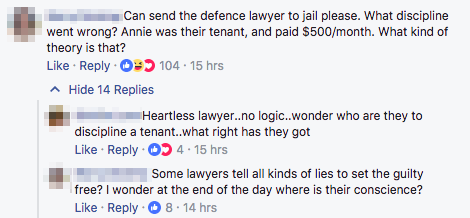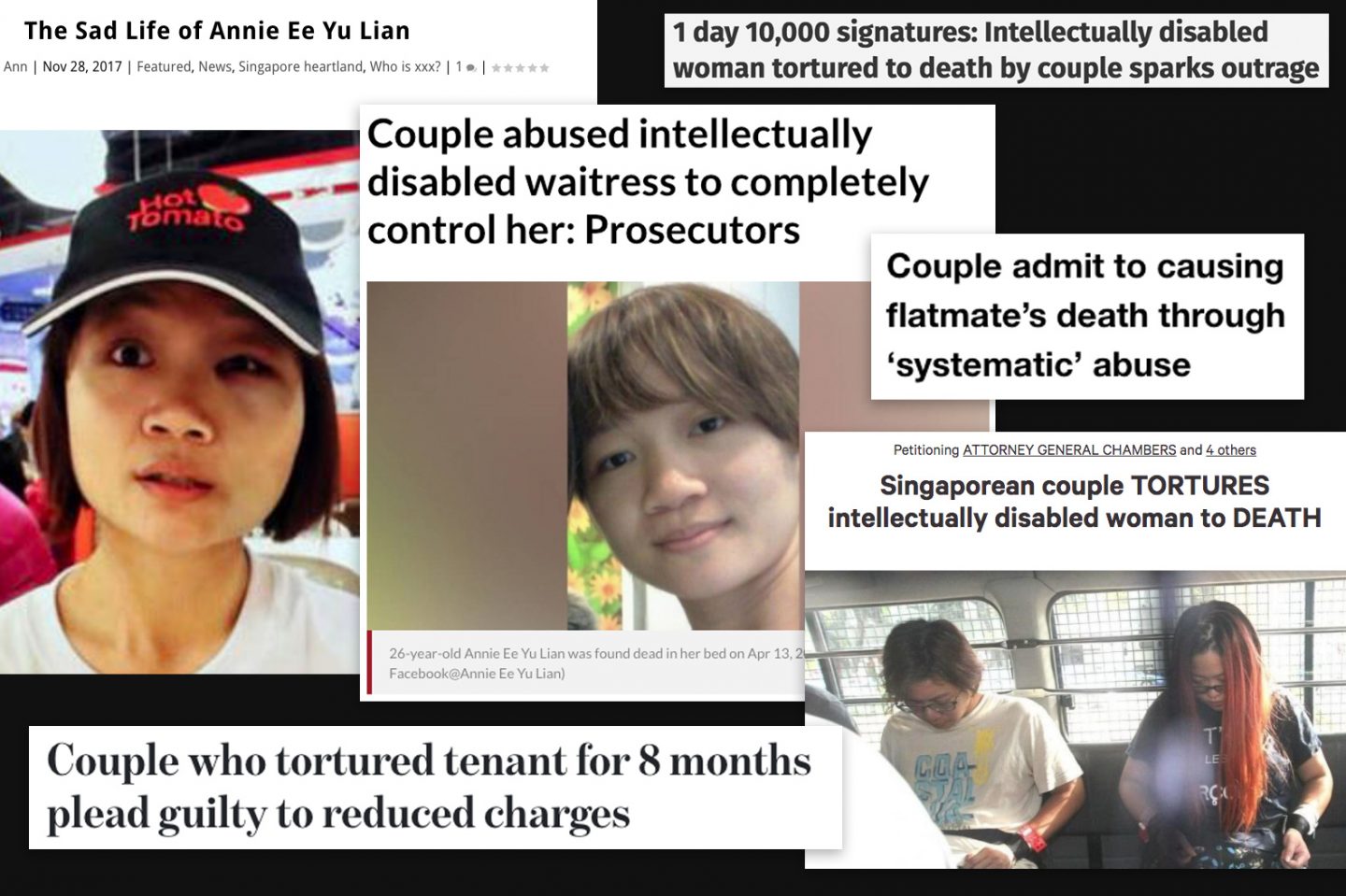UPDATE ON DECEMBER 1, 2017: The couple whose acts of causing grievous hurt with household weapons to intellectually disabled friend Annie Ee, 26, have been sentenced in the High Court.
Tan Hui Zhen, 33, was sentenced to 16.5 years in prison. Pua Hak Chuan, 38, will serve 14 years in prison, and receive 14 strokes of the cane.
This is the story I wish I never had to write. Just as, when you read it, it was the news article you wish you’d never had to read.
Intellectually impaired Annie Ee, 26, died after persistent and egregious physical abuse by Tan Hui Zhen, 33, and her husband Pua Hak Chuan, 38, who pleaded guilty to reduced charges of causing grievous hurt with a weapon.
I cried when reading the story, choked when trying to recount it to my wife.
There is much to despair about every detail. Annie had apparently moved in with a couple she trusted, having already been estranged from her own flesh and blood. The victim treated the couple as family, even calling Tan jie jie, her big sister.
And the specifics of the violence meted out – involving dustbins, shrink wrap rolls and even a “standby slapper” when one ran out of energy for the abuse – make the soul gasp for air. What depths exactly can the human condition plumb?
The couple will be sentenced on Friday morning, December 1. Unless the legal system takes a severe turn, they are unlikely to die, unlike poor Annie. For the death penalty to apply in Singapore, their intent to kill has to be explicitly proven.
But as the couple await their sentencing, the court of public opinion has had its say: An eye for an eye, blood for blood, life for life. Hang the murderers.

And, chances are: You feel this way too. I do.
The only positive I draw from all this is in seeing how the seeming absence of humanity in the guilty couple has brought to the fore the passionate humanity in the majority of Singaporeans. How could this happen? So close to home, here in Singapore?
It’s good to know that people care about others.
The call for punishments more severe than those allowed for under the reduced charge of causing grievous harm with a weapon has even led to an online petition which has drawn more than 10,000 signatories.
The widespread cry: How do we ensure justice is done?
What exactly is justice? How do we understand this concept as Christians?
Because the base instinct – eye for eye, life for life – seems the obvious interpretation. It makes sense. Yet when Jesus spoke about it, he turned the whole concept on his head, calling for the ridiculous/radical response of turning the other cheek (Matthew 5:38-42).
Why would He do that? Because our Father isn’t just a God of justice. If that were the case, it would always be the case where one bad act begets another. Sin for sin, suffering for suffering.
Our Father isn’t just a God of justice. There is a principle that runs throughout Scripture: That where justice is mentioned, mercy always follows in the same breath.
In Scripture, where justice is mentioned, mercy always follows in the same breath.
We see it in Hosea 12:6. Maintain love and justice. Zechariah 7:8. Administer true justice; show mercy and compassion to one another. Micah 6:8. Act justly, love mercy.
It exists in the Mosaic laws, where alongside the statutes for punishment sit sacrifices for atonement for wrongdoing, regular windows where debts are forgiven, and cities of refuge where perpetrators of manslaughter could claim asylum.
Jeremiah 9:24 reminds us that God is always simultaneously the God of justice, righteousness and lovingkindness. He cannot be one without the other. He is at once Truth and Love.
And so must we be.
My understanding of this is that the natural impulse for justice – fairness in our eyes – must be tampered with the unnatural imperative toward mercy.
What benefit does the call for death for the guilty bring? It satisfies the human instinct for retributive response.
Laws – whether the laws of a nation or religious laws – are placed as a measured standard against the immediate human response. They are designed to appeal only to objective fairness, calibrated across society and history, or founded upon a higher moral bar.
This explains the thankless position of the defence lawyer fighting for the rights of the indefensible criminal. I don’t envy those who took on the couple’s case; my guess is it was their choice to do so.

Such a lawyer fights not in the hope to win a case, but on the conviction that true justice be administered. Where there is a prosecutor, there must be an advocate; where there is a voice calling for retribution, there must be a voice calling for mercy.
It is thankless. But this is where I look to the highest example of one called an Advocate. “And if anyone sins, we have an Advocate with the Father, Jesus Christ the righteous.” (1 John 2:1)
Someone had to defend me, the indefensible, when no one else would. That principle holds true on Earth as in heaven.
To make things clear on a touchy topic, this is not a call for leniency for clearly egregious offenders.
True justice means that where wrongdoing occurs, punishment must correspondingly take place. We have a God who disciplines; those who do evil will be judged accordingly (Psalm 37:28, Romans 12:19).
I’m not even talking about a future judgment; I believe criminal justice must be fully administered on Earth. It is what I imagine the God of righteousness would expect.
I believe criminal justice must be fully administered on Earth. But we need to consider the part that human outrage plays in our response to matters that regard justice.
But we need to consider the part that human outrage plays in our response to matters that regard justice. The baying for blood and the vigilante vibe: Do they help or hinder the cause of true justice? What do they say about us as individuals and as a society?
How much better are we than Tan and Pua if we need to see the suffering of another to satiate us?
Their abuse of an innocent led to her death. But the abuse of the true spirit of justice exposes the death of innocence in this society.









